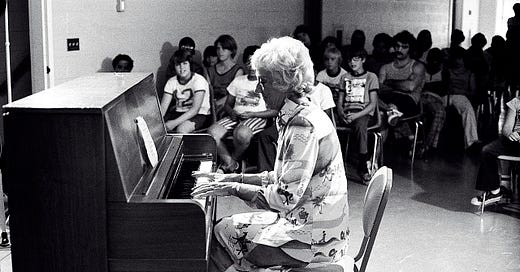When I lived in Athens, Georgia in college, I had a bunch of favorite shows on the local public radio station. Curtain Up was one, featuring weird, unlikely songs from Broadway and TV. But my favorite was Marian McPartland’s Piano Jazz, featuring the fantastic piano and interview skills of Marian McPartland. I listened to it every Sunday afternoon, enchanted by her voice, the guest roster, and most of all the music, performed live on the show.
I moved to Memphis in 1995 and was terribly disappointed to learn that WKNO (a great radio station) didn’t/doesn’t carry Piano Jazz. There is, however, a staggering amount of her recordings available online, and a trip down that rabbit-hole will be as rewarding as anything else you’ll do this week.
Take a look at the show’s guest list over the years, including:
Bill Evans
Oscar Peterson
Eubie Blake
Dudley Moore
Dizzy Gillespie
Carmen McRae
Henry Mancini
Blossom Dearie
Sarah Vaughn
Herbie Hancock
Gerry Mulligan
Mose Allison
Lionel Hampton
Dr. John
Stéphane Grappelli!
Dave Brubeck
I’m not even into the ‘90s yet and the list just gets more jaw-dropping. Ray Charles! Rosemary Clooney! Mel Torme! Eartha Kitt! Bela Fleck! Steely Dan! Elvis Costello! Tony Bennett! Studs Terkel(?)!
The format was simple: McPartland and her guest would each sit at a piano. There was no audience, just the two of them in an intimate tête-à-tête. She would ask insightful questions about music, the guest’s career, their life, and so on, and they’d chat for a few minutes. Then she would gently lead them into a song and they’d perform a piano duet. An hour would drift by: Conversation, song, conversation, song, conversation, song. It was marvelous.
Given the vast amount of recordings available, the question of what to share was tough.
In August 2001, McPartland made the only ever filmed episode of Piano Jazz. The guest was Dave Brubeck. It was done as a fundraiser for the show, and this episode had a live audience.
They played songs and reminisced, as usual, and then about halfway through, McPartland said she hadn’t been able to settle upon a song for them to play together. Would he mind if she just improvised a portrait of him in music? He said of course, and she said she hadn’t the faintest idea what she was going to play, then just launched in. This video should start at the lead-in to the piece, but if not you can skip to 31:33:
Imagine having the courage, confidence, and talent to offer to improvise a portrait of Brubeck while he is sitting right there. But she did, and it was marvelous. The whole episode is worth your time, of course.
When she died in August 2013, the NYT obituary noted that she had continued playing almost to the end. She played a concert the night before her 90th birthday, about which the Times reviewer wrote, “Ms. McPartland still has her pellucid touch and her careful yet comfortable style.”
The final paragraph of that obituary is delightful:
Unlike some jazz musicians of her generation, Ms. McPartland never became set in her ways; her playing grew denser and more complex with time, and even late in life she was experimenting with new harmonic ideas. “I’ve become a bit more — reckless, maybe,” she said in 1998. “I’m getting to the point where I can smash down a chord and not know what it’s going to be, and make it work.”
A few notes:
McPartland was one of very few women, and the only white woman, in Art Kane’s incredible 1958 photo “A Great Day in Harlem.”
Speaking of Brubeck, I met him once, circa 1996. He was playing at the Germantown Performing Arts Center in Memphis. I was 24 or so, and I went with a friend. Before the show we were chatting away and mostly ignoring the curtain speech, but thought we heard the person say something about a reception afterward. We didn’t think much of it, figuring poor people like us wouldn’t be invited anyway. After the show the curtain came down and everyone was filing out, and we decided to ask an usher about it. He said, “Oh, I’m not allowed to say anything about that,” while making a face and nodding his head in a way that clearly meant Go down that hallway over there. We did, and emerged onto the GPAC stage itself, behind the closed curtain. There was a huge table piled with vast amounts of food and booze, and the entire band, Brubeck included, was sitting around, taking care of instruments and chatting with whoever wanted to chat. There were only 15 or 20 of us fans back there, and everyone just wandered around grinning. I talked to his bassist for about 15 minutes, as we stuffed our faces and drank wine, then I went to meet Brubeck. He graciously signed my program, but he was clearly very tired; he was in his 70s, and I seem to recall he had flown in from Germany that day. It was a marvelous night.



